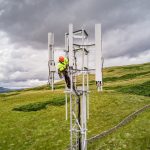UPDATE UK Labour and LibDems Give Hints of Future Broadband Policy
The May 2015 General Election is fast approaching and as a result we’ve been keen to canvas all of the major and some minor political parties in order to find out what they would do differently in terms of improving the national broadband connectivity landscape post-election. Today it’s the turn of the Labour Party and Liberal Democrats.
At present the Conservative Party, which dominates the current coalition Government alongside the Liberal Democrats, is expected to continue with its current Broadband Delivery UK programme (95% superfast broadband coverage by around 2017) and tweak this by helping to support commercial operators, particularly BT and Virgin Media, as they deploy “ultrafast” broadband technologies going forward (see the Budget 2015 news).
Advertisement
Meanwhile Satellite connectivity, supported by an installation subsidy, is then expected to play a part in connecting the final 1-2% (extremely remote rural communities), while an approach for filling the 3-4% gap between that and the first 95% target is yet to be confirmed.
Similarly we wouldn’t be surprised if the Liberal Democrats, when they finally get around to publishing their manifesto, follow a similar direction to the above because they have also played a limited role in BDUK’s formation through their position in the current Government. Indeed when we asked them the response was a mirror for BDUK.
A LibDem Spokesperson told ISPreview.co.uk:
“The Liberal Democrats strongly support broadband and mobile connectivity being urgently prioritised for rural areas.
We are pleased that the Coalition Government has invested over £1bn to improve this infrastructure. This is providing a welcome boost to homes and business throughout the countryside. Our aim as a party is to roll out superfast broadband to 95% of UK homes and businesses by 2017. You will be able find out more in our manifesto which will be released next week and available in various different formats on our website.”
But so far none of the key parties have actually published their full manifestos and as such we’re still largely in the dark about whether any of them will make a bold new commitment to enhance national broadband connectivity, beyond that of the current approach.
At this point I should say that ISPreview.co.uk is a broadly political neutral website and over the past 16 years we’ve been just as happy to praise, as well as criticise, the failings of both past and present Government’s with equal measure. In that sense we tend to judge political policies by how detailed, practical and economically viable they are, with a firm viewpoint towards identifying which would deliver the best benefit to consumers.
Advertisement
The Labour Approach to Broadband
Admittedly we’ve already seen various indications about what a British Labour government might do differently. Back in 2013 they proposed to divert £75 million from the then £150 million “super-connected cities” (Urban Broadband Fund) programme (here), which is currently being used to help businesses get a superfast broadband (30Mbps+) connection installed, and instead use it to help connect those in most need (i.e. the last 5-10% of neglected rural areas).
The reallocation, they claimed, could help an extra 2 million people to get online, although they didn’t flesh out precisely what kind of connectivity this would deliver. Equally this would mean abolishing the current business broadband voucher approach, which might irritate some of the 50 UK cities and surrounding areas that are currently able to apply.
More recently a group of Labour activists have called for a “national focus on connectivity” that would deliver 1000Mbps (1Gbps) broadband to all, with 10Gps connections for business hubs like Tech City (here). On top of that it also called for broadband to be made a Universal Service Obligation (USO) and required free “basic Internet” access for all citizens. The approach would be funded from a pot of £10bn and envisaged a 5-year deployment.
But a report from activists is also akin to a child’s overly optimistic Christmas wish list and as such does not represent an actual policy position. The good news is that Labour have given us a very rough outline of what they’d do differently if they won the coming election. The bad news is that it doesn’t tell us much.
Advertisement
A Labour Party Spokesperson told ISPreview.co.uk:
“The way in which Britain transforms into the digital age will play a large role in the future economic rewards our country can reap. Digital technology accounted for more than 21 per cent of growth in the world’s most advanced economies in the past five years, and Europe’s digital economy is expected to grow seven times faster than overall EU GDP in the years to come.
However, the Government has failed to deliver fast and reliable universal internet access, and will miss their target of delivering superfast broadband access to 90 per cent of the population by 2015. The Government is also taking three years longer to deliver basic broadband to 99 per cent of the population than set out in the plans left by the last Labour Government.
A Labour Government would take action and redouble our efforts to ensure that all homes and businesses can access high quality, fast and reliable broadband services. This will include superfast broadband being available to all parts of the UK that are not economic for the market to serve unaided.
We will also work with the regulator to ensure the right framework is in place to maximise the potential of private sector investment in broadband networks. High speed, reliable broadband access is increasingly essential to full participation in the digital economy, and a world class digital network for the whole of the UK will play a central role in creating jobs and boosting economic growth.
This will create a more connected Britain and open up new markets to many small and medium sized businesses across the country.”
Credit where credit is due. Labour were the first to take broadband seriously and the last Government did indeed promise “basic broadband” download speeds of 2Mbps for all by 2012, although by the time of the 2010 General Election this policy still hadn’t been fleshed out and their initial plans to fund part of the work via a tax on fixed phone lines ended up being shelved. As a rule it’s wise to take any politically charged attacks, from all parties, with a big pinch of salt.
So what about the promises for 2015 and beyond? Unfortunately there’s still no mention of funding or specific details, although we could interpret “superfast broadband being available to all parts of the UK that are not economic for the market to serve unaided” as being a mirror for the current BDUK approach.
But questions remain. Do Labour define “superfast” the same as the current Government? Over what timescale would this take place? What kind of connectivity are we talking about (fixed line, wireless, Satellite etc.) and how much funding would be required? Without such detail it’s difficult to identify how this differs from the current Government’s policy. We did ask for a response on these aspects, but have yet to receive the clarification.
Elsewhere the remark about working with Ofcom to ensure the right framework in order to “maximise the potential of private sector investment in broadband” doesn’t really tell us anything and the ambiguous wording could be interpreted in any number of different ways. One the one hand it might work to encourage BT’s rivals to invest, while on the other it could show more favouritism for the big ISPs in general or it may mean something completely different.
Like most in the electorate, what we really NEED to see are clear commitments in respect to funding, viable targets and a reasonable description of the goal by which to judge any future successes or failings. The current Government has the advantage of being able to show this and so hopefully the forthcoming manifesto releases will be able to deliver something that’s a little more constructive than the above.
UPDATE 13th April 2015
The full Labour Manifesto 2015 document has just been published, although sadly it only mentions the word “broadband” once and contains even less detail than their above quote. At least the quote they gave us last week used the word “superfast” instead of the arguably even more ambiguous “high speed” terminology below.
Labour’s Policy on Broadband
Labour will ensure that all parts of the country benefit from affordable, high speed broadband by the end of the Parliament [2020]. We will work with the industry and the regulator to maximise private sector investment and deliver the mobile infrastructure needed to extend coverage and reduce ‘not spots’, including in areas of market failure. And we will support community-based campaigns to reduce the proportion of citizens unable to use the internet and help those who need it to get the skills to make the most of digital technology.
Mark is a professional technology writer, IT consultant and computer engineer from Dorset (England), he also founded ISPreview in 1999 and enjoys analysing the latest telecoms and broadband developments. Find me on X (Twitter), Mastodon, Facebook, BlueSky, Threads.net and Linkedin.
« Virgin Media’s Next Broadband Speed Boost Edges Closer as 300Mb Spotted
The Quality of an ISP’s Bundled Broadband Router Does Matter »

















































Comments are closed